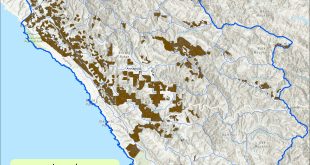Carbon Mitigation by Biofuels or
by Saving and Restoring Forests?
| by Renton Righelato and Dominick V. Spracklen Science / AAAS August 17, 2007 |
[summary:] Planting Forests is Better for Climate than Using Biofuels
Reforestation and habitat protection will do more to mitigate climate change than using biofuels, say two British researchers who have conducted one of only a few studies comparing the benefits of biofuels with other land use. Their analysis found that converting cropland to forest sequesters 2-9 times more carbon than the emissions “avoided” by biofuels grown on the same amount of land over a 30 year period.
For example, one hectare of temperate cropland converted to forest removes about 100 tonnes of carbon from the atmosphere, compared to about 15 tonnes of emissions avoided from the use of ethanol produced from a hectare of corn. The picture darkens further when one also considers the amount of land that would need to be cleared (most likely in developing nations) to meet upcoming biofuel mandates in Europe and the US; converting one hectare of tropical forest to cropland releases about 200 tonnes of carbon over 30 years.
Of all the biofuels considered, only woody biomass appears compatible with retaining forest carbon; biodiesel from woody biomass avoids about 60 tonnes of carbon emissions per hectare, and allows soil and above-ground carbon stocks to be built up while harvesting fuel sustainably. According to the researchers, if the main objective of biofuel policy is to reduce emissions, it may be wiser to instead focus on increasing fossil fuel efficiency, conserving existing forests and restoring forests on surplus croplands.
| The full article is available on the Science / AAAS website [registration required]. |
 Friends of Gualala River Protecting the Gualala River watershed and the species living within it
Friends of Gualala River Protecting the Gualala River watershed and the species living within it


